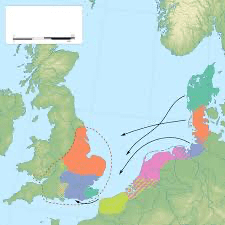English. The language I speak, and around 400 million other people speak too. Not the oldest, or the most spoken, but a cool one nonetheless. It all started in Britain, with the Celtic peoples and their language. It fused with Latin to form a native dialect. When the Romans left, and the Anglo-Saxons (a Germanic people) came, their language fused with the dialect and became Olde English (really, there’s no “e” in the old).
You may be asking, “Well, why isn’t English a Romance language?” Well, it’s because in Gaul ( ancient France) and Spain, the Romans were still there, and the Tribes were male warriors that settled down and their language mixed to form the Romance languages. In England, the Romans had left and had barely established a full presence, and the Anglo-Saxons brought their families, so they continued speaking their language, with few changes.
As you can see in the map below ⬇️, the Anglo-Saxons were made up of the Angles (in orange), who founded the kingdoms of Mercia, East Anglia, and Northumbria, the Saxons (in purple), who founded the kingdoms of Wessex, Sussex, and Essex, and the Jutes (in teal), who founded the kingdom of Kent. Each kingdom had a regional dialect, and their collective language continued relatively unchanged for centuries.

Then the Vikings came.
To them, and probably to you, Old English was very… weird. All sorts of weird rules and rulebrakers, odd plural rules and more. They decided to change it for the first time in centuries. Lots of our word are actually adaptations of Viking words. Then, the Normans, oh right, I forgot to tell you who the Normans are.
In the year 911, Rollo and his band of Vikings decided to raid the northern French coast, and King Charles the Simple ( means “pure”) decides to grant them the land if they accept Charles as their king. These “Northmen” became Normans as they married into the French population and became Christian. They were still warriors, and they spoke Norman French ( French with a little Norse mixed in). They expanded into Sutherland Italy and in 1066, conquered England.
Lots of words related to power, like beef, pork, and mutton are Norman French related, whereas words like cow, pig, and sheep are Old English related. Now, we have Middle English ( this is the kind of English Geoffrey Chaucer used in The Canterbury Tales ). Well, at least on paper. The people who wrote used all those fancy words that we think about, whereas the common peoples used way less organized, since they didn’t go to school. all of these local dialects and slang are what we call a vernacular language, or the local language. This is what the peasants spoke.
As the Renaissance and the Age of Enlightenment increased the levels of literacy across England, Middle English and the vernacular languages fused into New English, the language this blog is in. Today, we are still adding and removing words and English is still evolving. The United States in particular, with it’s major immigration rate, has added thousands of words to the English vocabulary. Many other languages have also added to the American accent like German and Irish.
The Future of English
As you can see, the dialects of British English and American English are slowly drifting apart. In the not-so-distant future, British and American may be their own languages. Maybe all of the languages may fuse into Human. Maybe this is all wrong. Maybe English will stay one language. Maybe there will be more languages than less. Maybe an asteroid will wipe us out before any of this can happen.
anyway, bye
WHY HAVEN’T YOU LEFT BY NOW!?!?!?!?!?!
Resources: I have read several books and watched videos about this topic over the years. It will be difficult for me to find the exact sources, but here are a few in case you want to fact check me or learn more!
Video: Why Americans Don’t Have English Accents
https://www.youtube.com/watch?v=PctwjXN-Xi4

This is a really entertaining explanation! Good job!